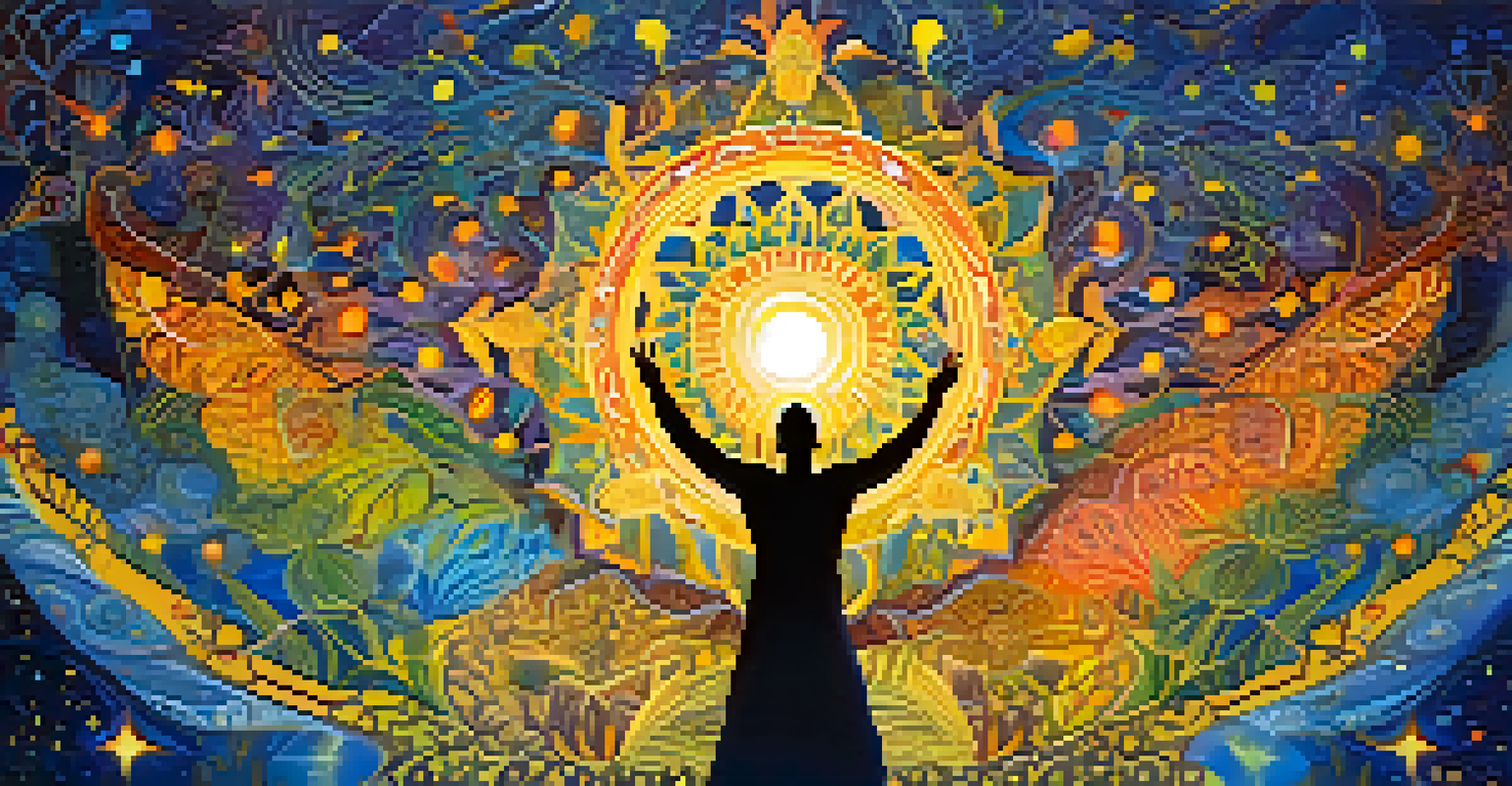Exploring Ayahuasca Therapy: Case Studies and Outcomes

Understanding Ayahuasca: Origins and Cultural Significance
Ayahuasca is a traditional Amazonian brew made from the Banisteriopsis caapi vine and other plants. Its origins trace back to indigenous cultures in South America, where it has been used for centuries in spiritual and healing ceremonies. The brew is believed to facilitate deep introspection and emotional healing, making it a focal point for those seeking alternative therapies.
The experience of Ayahuasca can be a profound journey that allows individuals to confront their past and heal emotional wounds.
The cultural significance of Ayahuasca goes beyond mere consumption; it is often integrated into community rituals and practices. Participants typically engage in guided ceremonies led by experienced shamans who create a safe environment for exploration. This context helps individuals connect with their inner selves and the broader universe, fostering a sense of belonging and purpose.
In recent years, Ayahuasca has gained attention in the Western world as people search for effective treatments for mental health issues. The blend of spiritual and therapeutic elements attracts those looking for profound personal transformation, making it a compelling subject for further exploration.
The Science Behind Ayahuasca: Psychological Effects
Scientific research into Ayahuasca has revealed a variety of psychological effects that can support emotional healing. Many users report experiences of catharsis, where they confront past traumas, leading to a newfound clarity about their life choices. This process can be likened to a deep emotional spring cleaning, where the mind is cleared of clutter and negativity.

Neuroscientific studies have indicated that Ayahuasca may promote neuroplasticity, the brain's ability to reorganize itself by forming new neural connections. This can be especially beneficial for individuals grappling with depression and anxiety, as it opens the door to new perspectives and coping mechanisms. Some participants describe feeling lighter and more liberated after their experiences.
Ayahuasca's Cultural Roots
Ayahuasca is a traditional Amazonian brew with deep spiritual and healing significance in indigenous South American cultures.
Moreover, Ayahuasca is thought to enhance emotional resilience, allowing individuals to better navigate life's challenges. By fostering a deeper understanding of oneself, many find that they can manage stress and anxiety more effectively, leading to improved overall mental health.
Case Study: Overcoming Addiction with Ayahuasca
One notable case involves a participant named Alex, who struggled with addiction for over a decade. After numerous failed attempts at traditional rehabilitation, he turned to Ayahuasca therapy. During his first ceremony, Alex confronted the emotions tied to his addiction, allowing him to connect the dots between his past traumas and his current behaviors.
Ayahuasca offers a unique opportunity for introspection, helping people to discover deeper insights about themselves and their lives.
Following several sessions, Alex reported significant changes in his mindset and behaviors. He described feelings of empowerment and clarity, which he had not experienced in years. This newfound perspective helped him establish healthier routines and relationships, ultimately leading to a successful recovery.
While Alex's journey is unique, it highlights a growing trend where individuals are turning to Ayahuasca as a last resort for overcoming addiction. The therapeutic aspects of the experience can provide essential insights that traditional methods may overlook, offering hope to those who feel trapped by their circumstances.
Case Study: Healing Trauma Through Ayahuasca Journeys
Another compelling story is that of Maria, who sought Ayahuasca therapy to heal from childhood trauma. During her ceremonies, she experienced vivid visions that forced her to confront painful memories she had buried for years. This process was both challenging and transformative, as it allowed her to process emotions she had long repressed.
Maria's journey through Ayahuasca therapy led her to understand the impact of her past on her present relationships. By gaining insight into her trauma, she was able to forgive herself and others involved, paving the way for emotional healing. The release she felt during her sessions was akin to lifting a heavy weight off her shoulders.
Therapeutic Benefits Explored
Research indicates that Ayahuasca can promote emotional healing, neuroplasticity, and resilience, offering new perspectives for mental health challenges.
Ultimately, Maria's story illustrates the potential of Ayahuasca therapy as a means of accessing and healing deep emotional wounds. While the experience can be intense, many find it to be a crucial step towards reclaiming their lives and fostering healthier connections.
Common Themes in Ayahuasca Experiences
Across various case studies, certain themes repeatedly emerge in participants' experiences. Many report a profound sense of interconnectedness, feeling as though they are part of something greater than themselves. This realization can shift their perspective on personal struggles, helping them view challenges as opportunities for growth.
Another common theme is the experience of emotional release, often described as a cathartic purge. Individuals frequently find themselves crying, laughing, or expressing emotions in ways they hadn’t allowed themselves to before. This emotional outlet is crucial for healing, as it helps participants let go of pent-up feelings that may have been hindering their progress.
Lastly, a shared sense of clarity often follows the Ayahuasca experience. Participants frequently leave sessions with actionable insights and a renewed sense of purpose. This clarity can serve as a catalyst for change, motivating individuals to pursue healthier lifestyles and relationships post-therapy.
Risks and Considerations of Ayahuasca Therapy
While Ayahuasca therapy has garnered attention for its potential benefits, it’s essential to acknowledge the risks involved. Some individuals may experience intense psychological distress during their journey, which can be overwhelming and frightening. It's critical for participants to be in a supportive environment with experienced guides to help navigate these challenges.
Additionally, Ayahuasca can interact negatively with certain medications, particularly antidepressants. This potential for adverse reactions underscores the importance of thorough medical evaluations before engaging in therapy. Consulting with healthcare professionals ensures that individuals make informed decisions about their mental and physical health.
Risks and Ethical Considerations
While promising, Ayahuasca therapy carries risks, emphasizing the need for supportive environments and thorough medical evaluations.
Lastly, the authenticity of the Ayahuasca experience can vary significantly based on the setting and the facilitator. Participants should seek reputable retreats with trained shamans who prioritize safety and ethical practices. This diligence can significantly influence the overall experience and outcomes of Ayahuasca therapy.
The Future of Ayahuasca Therapy in Mental Health Treatment
As interest in alternative therapies grows, Ayahuasca is increasingly being recognized for its potential in mental health treatment. Researchers are conducting more studies to understand its effects and mechanisms, which may lead to broader acceptance in mainstream healthcare. This shift could open the door for innovative treatment options for conditions such as PTSD, depression, and anxiety.
Moreover, the integration of Ayahuasca therapy into traditional mental health practices could provide a more holistic approach to healing. Combining conventional therapy with the insights gained from Ayahuasca could enhance therapeutic outcomes, offering individuals a comprehensive support system for their mental health.

Ultimately, the future of Ayahuasca therapy hinges on responsible research and ethical practices. As more evidence emerges about its benefits and risks, it has the potential to become a valuable tool in the mental health landscape, helping many find the healing and clarity they seek.